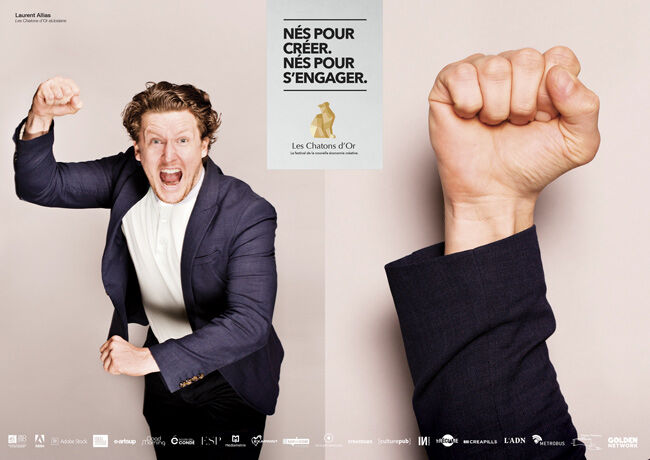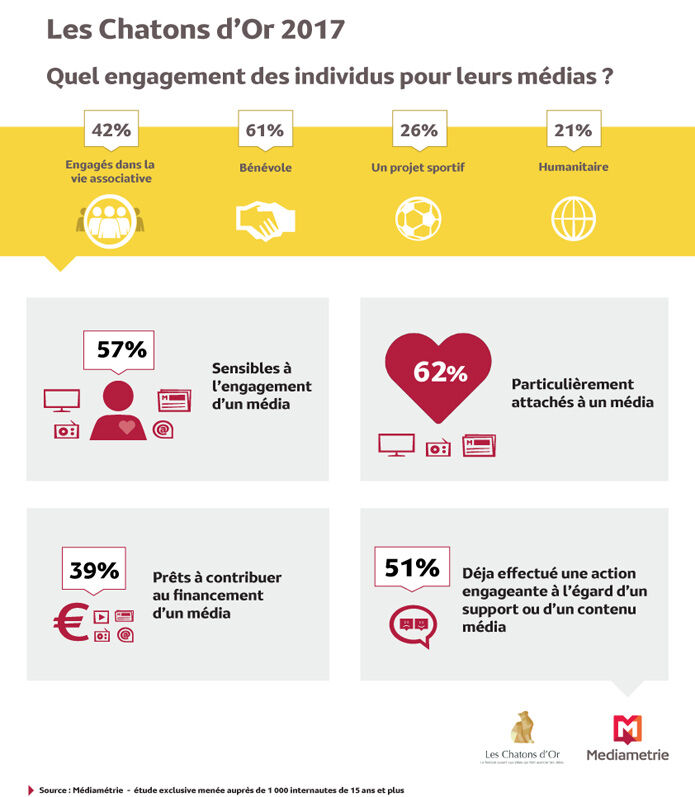- Home
- Results & Studies
- Engagement: a notion that is evolving in the digital era
Engagement: a notion that is evolving in the digital era

“Join up, they said!, Join up again, they said!”
Borrowing from René Goscinny and Albert Uderzo, this recurrent saying of the Roman legionaries in “Asterix and Obelix” also refers to French War Ministry slogans: “Join up or re-enlist in the Colonial Regiments”. Granted, the latter context is more serious than the comic book example, but the centuries-old notion of engagement shows very few signs of age! We returned to the meaning of this concept during the 2017 edition of the Festival des Chatons d’Or which took place from 3rd April to 25th May with the awards ceremony held on 13th June.
Our example does give us a first interpretation of engagement: a young man enlisting in the army; an individual or a group committing to a cause, an idea, or an ideal (political engagement is wonderfully described by Plato in the “First Alcibiades”, and later by Jean-Paul Sartre in “Dirty Hands”); a company recruiting an employee. A close interpretation would be a legally binding commitment. A marriage contract through which the two parties enter into a commitment to share their lives together. And in English, ‘engagement’ also refers to a period of betrothal. The word also has a sense of a start or beginning: to engage in a conversation, to engage in competition, or to begin a relationship. It is clear then that at its origin, engagement is dichotomous: it’s either yes or no.
Engagement in the broad sense, is understood to mean participation, of any kind, in an activity that requires a commitment, often linked to an association: sporting, cultural, political, leisure, cultural, humanitarian, charitable, trade union, etc … Do French people engage? Several surveys by the INSEE national statistics institute in France have over time provided an answer to this engagement with associations. In 1983, 43% of people aged 16 years and over were members of at least one fee-paying or free-to-join association. Thirty years later, in 2013, this rate was 42%, a remarkable stability.
The only real change over these three decades: the difference between men and women was less pronounced: it went from 53% for men and 34% for women in 1983 to 44% and 40% respectively. Finally, around half of individuals who "engage” do so by volunteering, paying indirect homage to Khalil Gibran who wrote in “The Prophet” (1923): “You give but little when you give of your possessions. It is when you give of yourself that you truly give”.
The impact of the digital era on engagement
The arrival of digital technology has changed the notion of engagement, transforming its dichotomous interpretation into a continuum, according to the extent of engagement. Someone surfing the web who merely clicks on a button to become a "friend", or to "like" a comment, opinion, product, or a place is probably less engaged that someone who becomes a champion or a spokesperson, creates a buzz or acts as an opinion leader.
Similarly, a search for a few sponsors to make a significant financial contribution and, therefore, become very engaged in a project, can be outdone by an abundance of low engagement players, also known as: crowdfunding, a rather ancient principle not far removed from the tontines created by Neapolitan banker, Lorenzo Tonti in the 17th century and still very much used in Africa today.
A topical concept
Has the evolution from an on or off commitment, all or nothing, to a highly nuanced engagement associated with digital technologies and the new economy altered some of the statistics concerning members of the public who have made a commitment? In an attempt to answer this question, in May 2017, Médiamétrie carried out an online survey of more than a thousand individuals aged 15 years and over into how engaged these individuals were in general and, more particularly, how engaged they were with media. It also considered engagement on the part of the media. The results of this study were presented on the evening of 13th June at the Chatons d’Or Festival. Four lessons were apparent from the study.
The first is that, four years after studies by the INSEE in 2013, the percentage of individuals who were involved in an association is unchanged: 42%. The nuancing of the concept of engagement had not altered behaviours for now. The second lesson is that the gap between men and women still exists, and that charity work is making headway, represented by 61% of those who made a commitment.
The third lesson is that engagement is intentional: 39% of those who had made a commitment did so when they were an adult, being fully aware of the significance of their action. The fourth lesson is qualitative: when asked which words first spring to mind when they hear the word "engagement", four dominant responses were expressed. Firstly, there were positive notions, such as loyalty, promise, respect, time, confidence, couple, union, marriage, and nice words describing and testifying to how enjoyable and valuable their commitment was. Secondly, reference was made to the aspect of obligation and ties: a more coercive perception of the engagement. Thirdly, there was the notion of responsibility, and fourthly, of a contract, which we already mentioned in the introduction.
How else could we conclude but with a thought for Stéphane Hessel, author of the famous “Time for Outrage!” (2010), and also of Get Involved! published in 2011 by Éditions de l’Aube?
PHILIPPE TASSI
Deputy Managing Director, Médiamétrie
JAMILA YAHIA MESSAOUD
Director of Media Behaviour, Cinema and Devices Departments, Médiamétrie
This article was published on Influencia on 22/5/2017
(http://www.influencia.net/fr/actualites/media-com,observatoire-influencia,engagez-vous-rengagez-vous-ils-disaient,7450.html)
How engaged are individuals with their media?
Les Chatons d’Or 2017 Study / Médiamétrie
1 person in 2 has already engaged in some manner with media
When asked about engagement on the part of the media, the main ideas evoked were: transparency, information, neutrality, and honesty. 57% of French people are aware of the engagement by a media in a cause or a project, of any nature. This is even more true among those aged over 50 and among women. And nearly 4 out of 10 people (39%) would be willing to contribute to the financing of media if they were affected by the cause, if it was dear to them or a good cause, or if they regularly read or watched this media.
Engagement also includes an “emotional” dimension: 62% of French people have a particular attachment to media, especially the traditional media and those embodied by individuals: television comes first, followed by radio, and then the press.
As regards the participation of each individual, 1 in 2 people had already engaged in some manner with media or with media content: expressing a positive or negative comment about a programme to family and friends; leaving a positive or negative comment on social networks or any other media; writing an e-mail or a letter to the editor or to the readers’ letters page. And 2 out of 3 people would be willing to do so.
Web users consider "liking" media a moderate act of engagement, scoring this 4.7 / 10. On the other hand, whenever they felt an attachment to the media, those "likes" equated to engagement.

3 questions for Laurent Allias, founder of Les Chatons d’Or festival and the Josiane ad agency.
1/ Why did you chose engagement as this year’s topic for Les Chatons d’Or?
Because to create is to engage.
Because creating Les Chatons d’Or was a form of engagement. For new ideas, new talent ... those about to break through or who need a springboard to do so. For the new creative economy.
More so than in all the previous years, this edition was centred on the theme of engagement because of the location: Oscar Niemeyer’s building, the historic headquarters of the French communist party. To celebrate engagement in such a powerful location that is also touched by history was a real honour for us and a fine mark of respect for our elders (Georges Marchais and Nelson Mandela among others) who earned distinction there, became engaged in great causes and changed mentalities.
2/ What lessons did you retain from the study conducted by Médiamétrie?
As is often the case, a study can challenge our personal judgments and our preconceived ideas about our world. Here, due to its plurality of definition, engagement offers us very different visions, and multiple perceptions. It is really interesting to see that, when it comes to the media, the notion of engagement is close to the concept of honesty, whereas we might have expected to see a more political, more partisan approach. There were many lessons in this study. Take a detailed look at it for yourself.
3/ Is engagement a notion that advertisers should explore in more depth?
In advertising, engagement is a word that is often heard. So yes, advertisers should explore it in more depth. But not only that.
We are right in the middle of two industrial revolutions, in a sort of half-light that prevents us from seeing where our world is going, as Antonio Gramsci said. In any case, we have no other choice: we must change. Our capitalist system has its limits; ecology and the transition to cleaner energy must be central to our thinking. Even today, one billion people go to bed hungry and 10% of France’s population is out of work. Extremist policies have never been so strong.
The whole of society must change.
Advertising, as a mirror of this society, must introduce new points of view, a new vision of our world. To help transform it.
And this goes well beyond campaigns for the "great causes": change occurs and new truths will emerge through the everyday.
des médias
edition
definitions